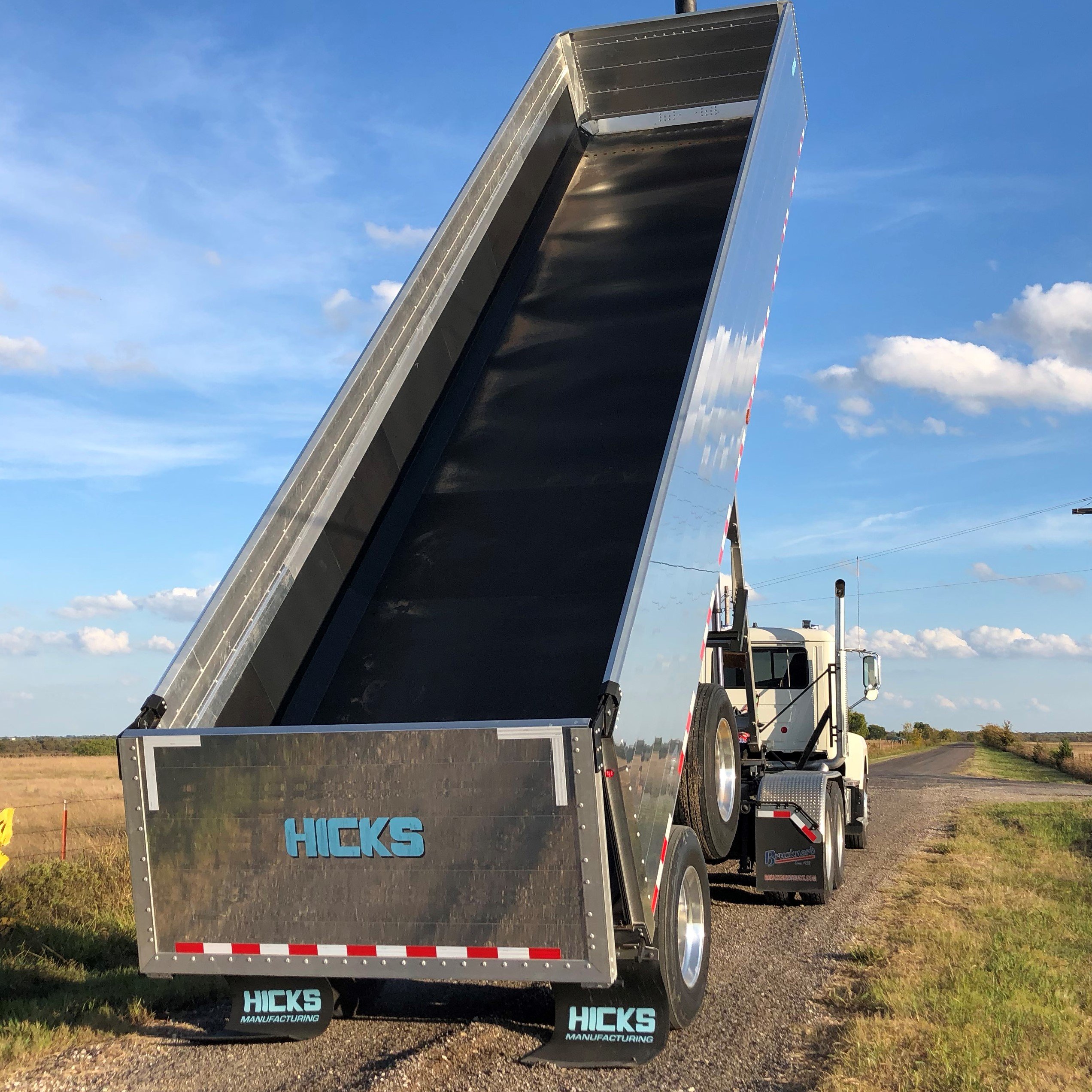Optimize Your Hauling: Should You Opt for a Liner?
In the competitive world of hauling, the performance of your equipment hinges on more than just its design. Whether you're considering UHMW, asphalt, or heavy-duty/steel liners, the right choice can significantly impact your trailer's longevity and your operational success. There are also scenarios where operating without a liner might be the best choice. At Hicks, we're committed to helping you make the best decision to ensure your hauling operations excel. Our expert guidance, custom specifications, and range of liner options will equip you with peak performance and equipment that outlasts the competition.
Weight Advantage: Aluminum end dump trailers and dump bodies offer significant benefits in terms of weight and payload capacity, but the effectiveness of your equipment also depends on the type of liner you choose.
Here’s a general overview of the three main types of liners and their applications:
1. UHMW (Ultra-High-Molecular-Weight Polyethylene) Liners
Application: UHMW liners such as those offered by Roechling, offers are designed for handling abrasive materials like sand, gravel, and aggregates. They provide a low-friction surface that facilitates easy unloading and reduces wear and tear on the trailer.
Benefits:
- Durability: Highly resistant to abrasion, extending the trailer’s lifespan.
- Low Friction: Eases material unloading and minimizes build-up.
- Corrosion Resistance: Withstands various environmental conditions and chemicals.
2. Asphalt Liners
Application: Asphalt liners like the ones offered by Quicksilver, are tailored for handling hot and sticky materials like asphalt. They prevent the material from adhering to the trailer, addressing common issues with heat and stickiness.
Benefits:
- Heat Resistance: Endures high temperatures without degrading.
- Non-Stick Surface: Reduces material adhesion, simplifying unloading.
- Ease of Maintenance: Makes cleaning and maintenance tasks easier.
3. Heavy Duty Liners
Application: Heavy duty liners made of steel or non-steel alternatives like those from Haulk® are well-suited for tougher and more abrasive materials such as rocks and large aggregates. Some trailer and dump body manufacturers custom build their own. They provide a robust surface that can handle heavy-duty use and resist damage. The combination of aluminum’s lightweight nature and the durability of heavy-duty liners means you can handle heavy and abrasive materials like rocks while still benefiting from significant weight savings, resulting in more weight savings than with a steel trailer.
Benefits:
- Strength: Offers superior protection against heavy and abrasive materials.
- Durability: Long-lasting and capable of withstanding rigorous conditions.
- Toughness: Ideal for handling materials that require a strong, resilient surface.
How to Determine If a Liner Is Right for Your Trailer: Key Factors to Consider
While liners can enhance the durability and efficiency of your trailer, there are scenarios when opting out of a liner might be beneficial. The choice to forgo a liner often depends on the type of material being hauled and the specific conditions of use. Understanding the material you're hauling and your operational needs can help determine whether a liner is the best choice or if your trailer can perform optimally without one.
Take these points into consideration:
-
Material Characteristics:
- Abrasion Level: Assess how abrasive the material is. Highly abrasive materials like gravel or crushed rock can cause significant wear and tear on trailer surfaces, often making a liner beneficial.
- Corrosiveness: Determine if the material is corrosive. Materials like asphalt or certain chemicals can degrade aluminum or steel over time, suggesting the need for a protective liner.
- Temperature: For materials that are transported at high temperatures, such as hot asphalt, liners with heat-resistant properties might be necessary to prevent damage and facilitate easier unloading.
-
Operational Conditions:
- Load Volume and Frequency: High volumes and frequent loading/unloading can increase the likelihood of wear on the trailer. A liner might help extend the trailer's lifespan under such conditions.
- Unloading Methods: Consider how the material is unloaded. If the unloading process involves high friction or impact, a liner can reduce wear and make the process smoother.
- Maintenance and Cleaning: Evaluate how easy it is to clean the trailer and maintain it. Liners can simplify maintenance, but if the trailer material is resilient and cleaning isn't challenging, a liner might not be necessary.
-
Cost and Efficiency:
- Upfront Costs: Weigh the initial cost of installing a liner against potential savings in maintenance and repairs. For some operations, the cost of a liner may not justify its benefits.
- Operational Efficiency: Determine if a liner will enhance operational efficiency. For instance, reducing friction and facilitating easier unloading with a liner can improve overall productivity.
-
Manufacturer Recommendations:
- Expert Advice: Consult with manufacturers or industry experts who can provide insights based on their experience with various materials and trailer types. They can help assess whether a liner is needed based on the specific conditions of your operations.
Optimize Your Hauling. Let Hicks Help You Choose.
At Hicks, we offer various liner options so you can select the best fit for your hauling needs. Our team is here to help you make the optimal choice for your trailer, ensuring you get the most out of your equipment. And, when you choose Hicks, you choose superior performance with a trailer or dump body that outlasts the competition.

